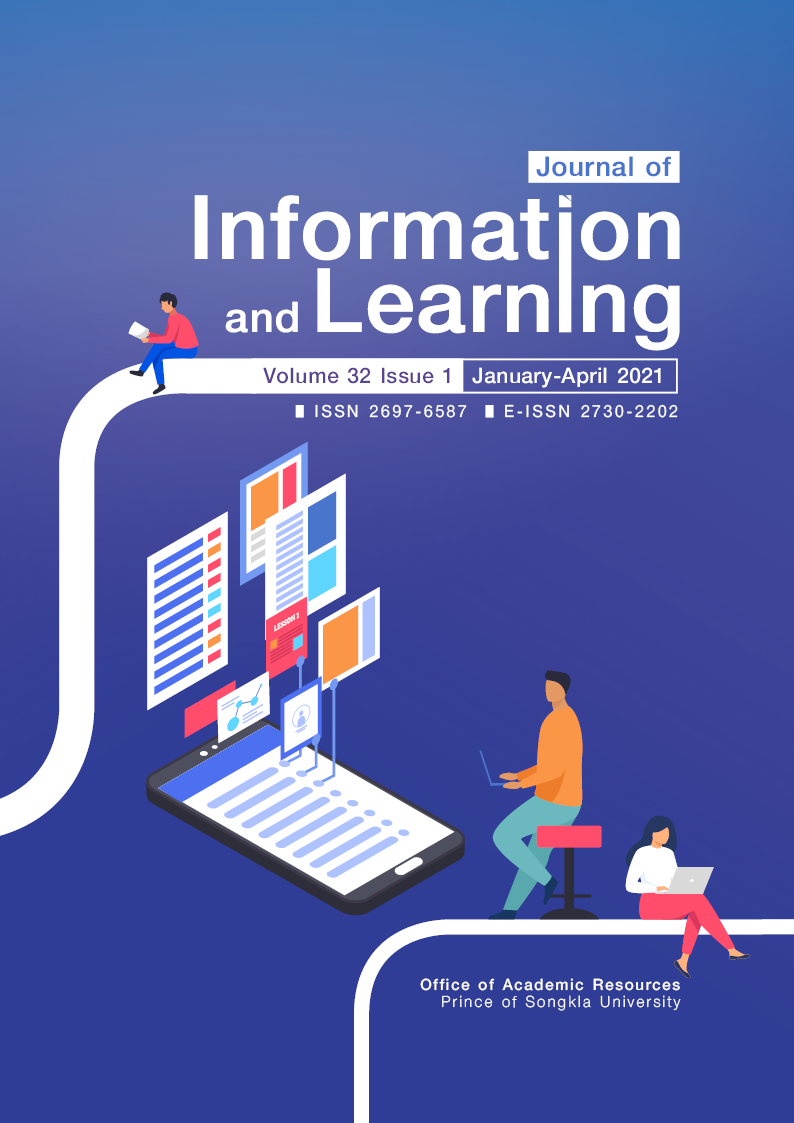Development of A Program Enhancing Digital Ethics Reasoning for Lower Secondary School Student Using Outcome-Based Education and Cased-Based Learning Approaches
Main Article Content
Abstract
This research aims to study the effect of the application of program enhancing digital ethical reasoning abilities on lower secondary school students using outcome-based education and case-based learning approaches. The research was conducted by developing two sets of research instruments: 1) The program enhancing digital ethical reasoning abilities of lower secondary school students using outcome-based education and case-based learning approaches. 2) The digital ethical reasoning quiz for lower secondary school students. The program was experimentally applied to a sample group of 37 Mathayom Suksa III students who enrolled in the subject of Digital Citizenship Assembly Activities in the 1st Semester, Academic Year 2020. The sample group have been selected by using purposive sampling method. The data were analyzed in two parts: Part 1: quantitative data analysis using arithmetic mean, standard deviation, finding relative gain scores and t-test dependent, and Part 2: qualitative data analysis by content analysis.
The results of the quantitative research indicated as follows. 1) The students who received the learning management using outcome-based education and case-based learning approaches had the scores of post-test digital ethical reasoning skills higher than the scores of pre-test digital ethical reasoning abilities with a statistical significance level of .05 2) The students who received the learning management using outcome-based education and case-based learning approaches learning had higher relative gain scores of digital ethical reasoning accounted for 21.06%.
Article Details

This work is licensed under a Creative Commons Attribution-NonCommercial-NoDerivatives 4.0 International License.
The Journal of Information and Learning is operated by the Office of Academic Resources, Prince of Songkla University. All articles published in the journal are protected by Thailand copyright law. This copyright covers the exclusive rights to share, reproduce and distribute the article, including in electronic forms, reprints, translations, photographic reproductions, or similar. Authors own copyrights in the works they have created as well as the Office of Academic Resources. The Journal reserves the right to edit the language of papers accepted for publication for clarity and correctness, as well as to make formal changes to ensure compliance with the journal's guidelines. All authors must take public responsibility for the content of their paper.
References
Asarat, Ch., Seehamongkon, Y., & Poolpholamnoey, W. (2014). The development of key core competency indicators in ability to use technology of the basic education core curriculum 2551 for High School Students. Journal of Education Measurement Mahasarakham University, 20(1), 49-64.
Charoenwanit, S. (2017). Cyber bullying: Impacts and preventions in adolescents. Thai Journal of Science and Technology, Thammasat University, 25(4), 640-648.
Dricoll, A., & Wood, S. (2007). Developing outcomes-based assessment fo learner-centered education. Verginia: Starling.
Kohlberg. (1967). The cognitive-development approach to socialiization. In D.A. Goslin (E.d.), Handbook of socialization theory and research (pp. 347-480). Chicago: Rand McNally.
Vinijnaiyapak, N. (2017, March 22). Thatsanakhati khō̜ng dek læ yaowachon Thai tō̜ phrưttikamkān klanklǣng bon lōk sai bœ̄ [Attitudes of Thai Children and Youth on Cyber Bullying Behavior]. Retrieved from http://27.254.57.147/file_upload/poll/document/20170322084506.pdf
Sompuet, P. (2013). Development of a blended learning model with case-based learning using yonisomanasikara approach to develop reflective thinking and professional media ethics decision making for undergraduate students of rajabhat university (Doctoral thesis). Chulalongkorn University, Bangkok.
Suwannakit, M. (2017). Legal measures to protect child and juvenile from cyber-bullying. Naresuan University Law Journal, 10(2), 49-70.
Techataweewan, W., & Prasertsin, A. (2013). Digital literacy assessment of the Undergraduate Students to the Universities in Bangkok and Its Vicinity. Journal of Information Science, 34(4), 1-28.
Spady, W. (1994). Outcomes-based education. Belconnen, ACT: Australian Curriculum Student Association.


